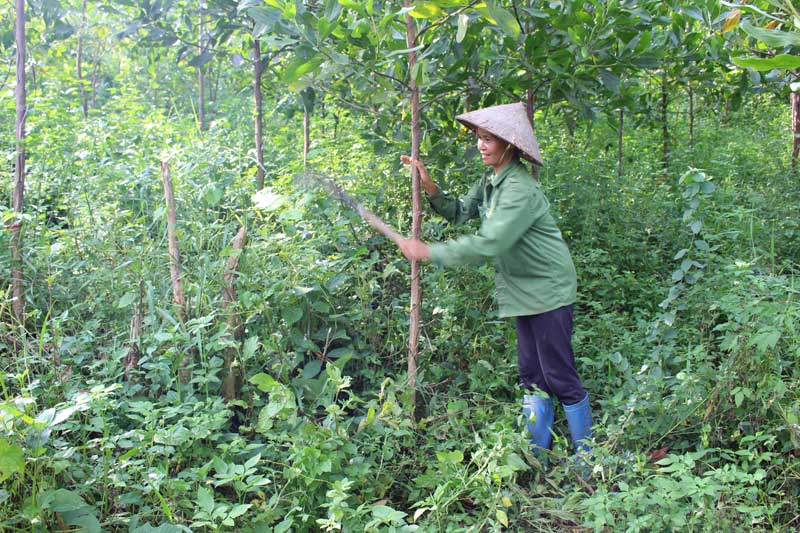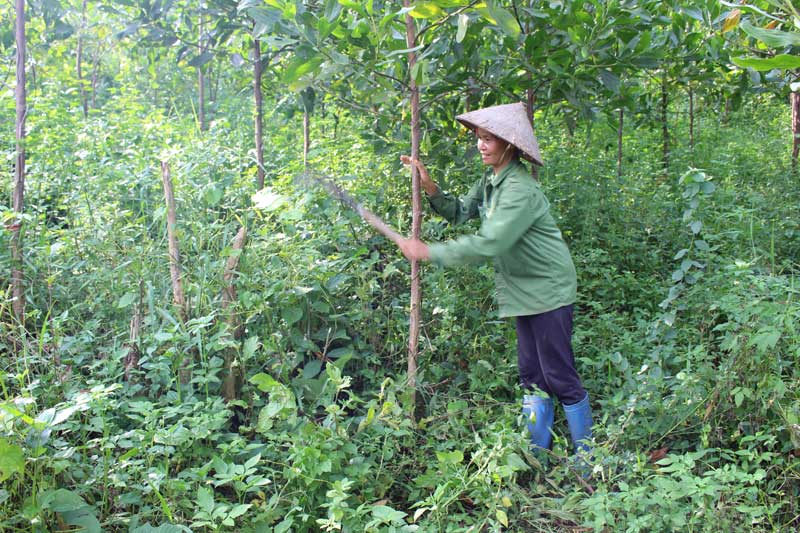
(HBO) - After nearly 3 years, we returned to Nieng village, Hung Thi commune (Lac Thuy), which is one of the 36 most difficult villages in the province. We feel a remarkable change in the the rural face, and the local people's lives have been improved significantly.

Ms. Bui Thi Phuong's family earned nearly 100
million VND from the model of acacia planting and animal husbandry.
Hung Thi Commune has promoted propaganda,
mobilized the local people to be more active, creative, exploring development
of economic models. In particular, the acacia tree is identified as the main
plantation with a total area of over 300 hectares, 60 hectares of the area
can be harvested. Most of the households maintain to plant on 1-2 hectares,
some households have expanded the area to over 10 hectares. The value of 1
hectare of acacia trees in the cycle of 5 years can be profited from 45 to 60
million VND, depending on the quality.
Besides promoting forestry development, the
households maintain and develop livestock and poultry with over 3,400 animals.
In addition, some new models such as citrus planting, chili planting are
invested to pilot planting by farmers. Since then, some typical households have
earned over 100 million VND per year, such as: the households of Mr. Bui Tien
Trung, Mr. Bui Van Thang C, Mr. Bui Thi Phuong, etc.
We visited Ms. Bui Thi Phuong's family, a
typical household in the economic development of the commune. Currently, Ms.
Phuong's family plants 9 hectares of acacia, 8 hectares of which is in the
business period. In addition, her family invested in wood furniture workshop.
Ms. Phuong said: "In the past, my family economy was mainly based on
agricultural production, that was so hard working but we could not live on.
Since 2011, I borrowed the loan from the bank to expand the area of planting
acacia and developing a variety of industries such as chicken farming,
household furniture processing, etc. Currently, acacia is identified as a main
plant, 1 hectare of acacia with the cycle of 5 years of good varieties can make
the earning of 45- 50 million VND. In 2017, the family earned over 100 million
VND from economic models. "
To help people access to preferential loans,
the commune cooperated with the bank to create conditions for more than 100
households to borrow with total outstanding loans of 4 billion VND. Every year,
departments, unions organize 2-3 training sessions, transferring science and
technology.
According to data from the Hoa Binh Provincial Party Committee, the industrial production index for the first six months of 2025 is estimated to have increased by 20% compared to the same period last year. This marks the highest year-on-year growth rate for this period since 2020.
In the first six months of 2025, Hoa Binh province’s export turnover was estimated at 1.145 billion USD, marking an 18.11% increase compared to the same period in 2024. Import turnover was estimated at $ 804 million, a 17.15% increase, which helped the province maintain a positive trade balance.
The lives of the ethnic minority farmers in Tan Lac district have gradually improved thanks to the new directions in agricultural production. This is a testament to the collective strength fostered through the professional associations and groups implemented by various levels of the district’s Farmers’ Union.
With the motto the "product quality comes first,” after nearly one year of establishment and operation, Muong village’s Clean Food Agricultural and Commercial Cooperative, located in Cau Hamlet, Hung Son Commune (Kim Boi district), has launched reputable, high-quality agricultural products to the market that are well-received by consumers. The products such as Muong village’s pork sausage, salt-cured chicken, and salt-cured pork hocks have gradually carved out a place in the market and they are on the path to obtaining the OCOP certification.
In the past, the phrase "bumper harvest, rock-bottom prices" was a familiar refrain for Vietnamese farmers engaged in fragmented, small-scale agriculture. But today, a new spirit is emerging across rural areas of Hoa Binh province - one of collaboration, organisation, and collective economic models that provide a stable foundation for production.
Maintaining growing area codes and packing facility codes in accordance with regulations is a mandatory requirement for agricultural products to be eligible for export. Recently, the Department of Agriculture and Environment of Hoa Binh province has intensified technical supervision of designated farming areas and packing facilities to safeguard the "green passport" that enables its products to access international markets.



